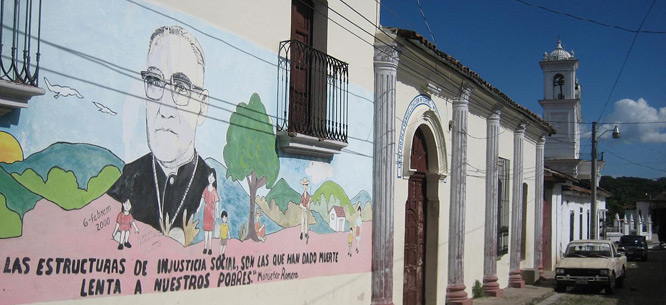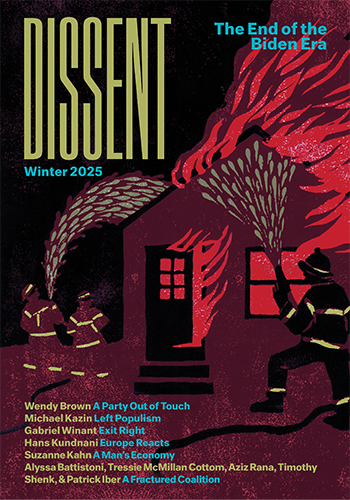Charity or Justice? Pope Francis Revisits Liberation Theology
Charity or Justice? Pope Francis Revisits Liberation Theology
Under Pope Francis, the Vatican has shown sympathy for a radical Catholic tradition. But Francis sidesteps liberation theology’s most revolutionary ideas.

What Hegel said about philosophy can be said of theology: it rises only at sundown.
—Gustavo Gutiérrez
Late last month, Pope Francis told reporters he considers it very important that the beatification of Oscar Romero—the process of declaring Romero officially “blessed” that is the stepping-stone to sainthood—be accomplished quickly. “Romero is a man of God,” the pontiff said, and the process “must move now.”
Romero has long been recognized as the unofficial saint of liberation theology. Pope Francis’s signal that the late Salvadoran Archbishop now has a legitimate path to sainthood is the latest in a series of statements to trigger media speculation that the pontiff seeks a rapprochement with the controversial Catholic movement.
Liberation theology arose in Latin America after the Second Vatican Council, challenging the Church and believers to embrace both the cause and the perspective of the poor and to fight intractable political and economic injustices identified as “structural sin.” Romero undeniably embodied this spirit. A conservative when elected Archbishop of San Salvador in 1977, Romero soon found himself defending priests influenced by liberation theology. These priests, and like-minded laypeople, deliberately lived and worked among the country’s poorest, and allowed the needs of the poor to shape their vision of the Church’s role in a deeply divided society. Romero underwent a kind of conversion. He decried egregious abuses of human and ecclesial rights, rebuked the military, spent time in jail, and finally was assassinated in 1980 while saying mass in the chapel of a San Salvador hospital. Most observers believe he was killed by the military or pro-government paramilitaries. Clearing the path to his beatification amounts to an official declaration that the liberationist defense of the poor that cost him his life was an act of Catholic faith, rather than politics.
Other statements on Central America have likewise signaled the Vatican’s re-opening to liberation theology. Two weeks before his comments on Romero, Pope Francis reinstated Nicaraguan priest Miguel D’Escoto, whom John Paul II suspended thirty years ago for refusing to vacate his post as Foreign Minister in Nicaragua’s broad-based revolutionary government. D’Escoto stayed in government and founded Orbis Books—the press that eventually brought liberation theology to the English-speaking world through translations of key texts like Gustavo Gutiérrez’s foundational Theology of Liberation (1973) and original historical and political works including Phillip Berryman’s Religious Roots of Rebellion (1984).
D’Escoto’s reinstatement could be read as a harmless favor to an old man rather than as a theological statement; D’Escoto, 81, had formally requested the Vatican lift the ban so that he could once again celebrate mass before dying. But even on mainstream Catholic news outlets the story provoked vitriolic comments denouncing D’Escoto as a heretic who should have been excommunicated for endorsing liberation theology and denouncing Francis for choosing mercy over discipline. D’Escoto’s connection to liberation theology certainly is not lost on Catholic conservatives.
But by far the Vatican’s most substantial endorsement of liberation theology since Pope Francis’s inauguration was a little-reported policy reversal in the diocese of San Cristóbal de Las Casas, in Chiapas, Mexico. In May, Bishop Felipe Arizmendi Esquivel announced the Vatican had approved his plan to ordain one hundred new permanent indigenous deacons. This revives a liberation theology-linked practice that transformed the Chiapas Church between the 1960s and the early 2000s.
The Vatican’s recent reversal in Chiapas, then, marks a concrete return to liberation theology’s mode of engagement with the region’s poorest. Together with the other recent actions, how does it suggest liberation theology will inform Francis’s papacy?
That there has been some kind of reconciliation with liberation theology under Francis—reaching from Central America to the heart of the Vatican—seems indisputable. The current prefect for the Congregation of the Doctrine of the Faith, Gerhard Müller—appointed by Pope Benedict in 2012 and made cardinal by Francis earlier this year—was a student of founding liberation theologian Gustavo Gutiérrez. (The two co-authored a book, On the Side of the Poor,in 2004.)Francis himself has made the “preferential option for the poor” central to his theology. Some see Francis as the author of a “refined version of liberation theology” himself.
But the extent and significance of this reconciliation can be overstated. There are clear differences between the liberation theology Francis has voiced and that articulated in the 1960s and 1970s. One of these is the attitude to social science. Francis has not adopted or even borrowed much from the insights of Marxist and dependency analysis, as many liberation theologians did. Some hear echoes of Karl Polanyi in Francis’s social teachings, particularly when Francis deplores “the absolute autonomy of the marketplace.” But as religious historian Brian Hamilton has argued on the site The Immanent Frame, Francis’s perceptive analyses of global economics rest on “a kind of ad hoc cultural phenomenology” rather than on “any engagement with the social sciences.”
If Francis is wary of endorsing either Marxist or neoclassical economics, he is not alone. But there are two elements of contemporary political-economic discourse that could help Francis move beyond his toothless description of social dysfunction. The first is the rising tide of debate around inequality as a central problem of market society. (The sensation surrounding the English translation of Thomas Piketty’s Capital in the Twenty-First Century is part of this debate, but doesn’t encompass it.) The second is the role of the state in policing that inequality.
Central America has always been a laboratory of market-driven inequality, backed by the brute force of the state. Romero’s assassination, the revolutionary commitment of D’Escoto and Christian communities in Nicaragua, and the Maya defense of community that culminated in the 1994 uprising in Chiapas all were driven by the dislocations of global capitalism and the heavy hand of U.S. client regimes. In Guatemala, too, the Maya genocide perpetrated by the U.S.–backed military government led to a bishop’s assassination: Bishop Juan Gerardi was bludgeoned to death by army officers in 1998, two days after releasing a national report on human rights abuses during Guatemala’s decades-long civil war.
Francis’s insistence that charity is the only remedy for the excesses of capitalism is in effect an acquiescence to neoliberal logic.
Francis addressed inequality and its human costs at length in his 2013 apostolic exhortation Evangelii Gaudium. “Inequality,” he concluded, “is the root of all social ills.” But he has said very little about the state. Instead, he appeals to Christian charity. He recently stated, for example, that the thousands of unaccompanied child migrants from Central America to the United States are too often the “subject of racist and xenophobic attitudes,” and that instead they “must be welcomed and protected.” In the face of this and other lived experiences of the deracination and dehumanization of global capitalism, Francis quotes John Paul II, calling on the Church to make an “option for the poor which is understood as a ‘special form of primacy in the exercise of Christian charity.’”
The core commitment of liberation theology has been to make theology a critical reflection on the lived experience of the poor—an existential stance regarding the dignity of marginalized human beings in their real historical circumstances, rather than abstract reasoning toward supposedly timeless truths. Material reality on the side of the poor must be lived, argued Gutiérrez; only then can theological conclusions be derived from it.
Francis’s anguished sympathy for the poor and exploited undoubtedly reflects his time among them, and his urgent call to charity understandably seeks to mitigate the harshness of life on the margins. But it does not reflect the full experience of the poor, whose oppression at the hands of the neoliberal state cannot be remedied through generosity alone.
There is strong evidence, for example, that the wave of unaccompanied minors leaving Central America is caused in part by the vast sums of new military equipment and training flowing to police units in Guatemala, El Salvador, and Honduras, where these units are accused of torture, corruption, and complicity with the drug-fueled gangs they are supposed to be fighting. (This may help explain why there are scarcely any Nicaraguan children at the Texas border. Nicaragua is the poorest country in Central America, but it has the lowest rate of violent crime—along with the smallest police force and the smallest prison population in the region. It does not have close ties to the United States.) Central American children who attempt to flee must pass through Mexico, where the Mérida Initiative has unleashed spectacular violence and routine torture. If they survive to reach the border, they find it heavily militarized. If they cross it they are likely to be deported before they can apply for refugee status or contact relatives. Central America’s most marginalized suffer not just abstract inequality (as Francis’s statements suggest), but also at the hands of the state. Meanwhile in Chiapas, where catechists and deacons helped support an indigenous uprising, the national state and global market are held—partially and tentatively—at bay.
By invoking John Paul II’s formulation of the “option for the poor” as a call to Catholic charity, Francis obscures what should be plain. He denounces the neoliberal mythology of the autonomous and self-regulating market and the market-based commoditization of human life. But his refusal to take on the state, his insistence that charity is the only remedy for the excesses and materialism of capitalism, is in effect an acquiescence to neoliberal logic.
This does not just reflect a paucity of social theory. One does not need Marxist economics to see that encouraging the free flow of commodities while criminalizing the flow of labor will trap the poor between a rock and a hard place. One does not need to stake out a theological position on the efficient markets hypothesis to see that arming police like soldiers will lead to collateral damage. Francis prays for politicians who will take inequality seriously, but never makes reference to liberation theology’s cornerstone scriptural story: the Exodus, when with God’s help the Hebrews freed themselves from slavery.
“Charity,” St. Augustine wrote, “is no substitute for justice withheld.” If the Vatican truly wishes to engage with liberation theology, rather than eulogize it in its sunset moments, Pope Francis will have to address the power behind the markets—the police, the military, and the whole military-carceral state—as Romero, D’Escoto, and indigenous communities in Chiapas did.
Eric Frith is a doctoral candidate in history at Columbia University.




